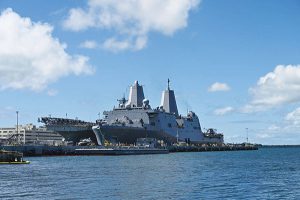Bloomberg
The US and its two top Asian allies announced they had conducted a joint missile defense exercise off Hawaii, raising the profile of exercises that show their willingness to work together in the face of threats posed by North Korea and China.
The anti-missile drill took place Aug. 8-14 at the same time as the multinational Pacific Dragon exercise, the Department of Defense said in a statement released Tuesday, Asia time. The three countries agreed at a ministerial meeting in Singapore in June to conduct the drill, the department said.
While the drills have been held every two years since 2012, they weren’t publicized in 2018 or 2020 as tensions flared between Tokyo and Seoul. Then South Korean President Moon Jae-in was also wary of making public military maneuvers that could sour ties with China or his rapprochement with North Korea.
President Yoon Suk Yeol, a conservative who replaced Moon in May, has moved to step up joint exercises with the US as his government takes a tougher line with China and the North. The Biden administration has tried to bolster the alliance with Japan and South Korea as it seeks to build a united front on issues ranging from security to supply chains for semiconductors.
“The purpose of this exercise is to strengthen the ability to respond against ballistic missiles and improve the ability to conduct joint operations,†South Korea’s defense ministry said in a statement Tuesday about the drills. Moon’s government in June said the Pacific Dragon drills would be held, using destroyers with Aegis missile-defense systems to respond to threats from North Korea. Over the past few years, Kim Jong Un’s regime has modernized its missile arsenal, testing new missiles that are quick to deploy, maneuverable in flight and designed to evade US-operated defense shields in the region. The US, Japan and South Korea have all warned that North Korea is also readying to conduct its first nuclear test since 2017.
China’s firing of ballistic missiles that Japan said landed in its exclusive economic zone close to Taiwan earlier this month heightened tensions between Tokyo and Beijing, which often spar over human rights and historical grievances. China’s live-fire exercises were a show of anger over US House Speaker Nancy Pelosi’s visit to Taipei.
 The Gulf Time Newspaper One of the finest business newspapers in the UAE brought to you by our professional writers and editors.
The Gulf Time Newspaper One of the finest business newspapers in the UAE brought to you by our professional writers and editors.
